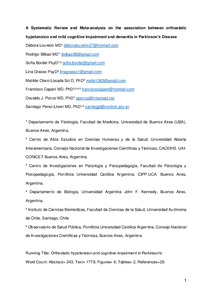Por favor, use este identificador para citar o enlazar este ítem:
https://repositorio.uca.edu.ar/handle/123456789/16231| Título: | A systematic review and meta-analysis on the association between orthostatic hypotension and mild cognitive impairment and dementia in Parkinson's disease | Autor: | Loureiro, Débora Bilbao, Rodrigo Bordet, Sofía Grasso, Lina Otero Losada, Matilde Capani, Francisco Ponzo, Osvaldo J. Pérez Lloret, Santiago |
Palabras clave: | DETERIORO COGNITIVO LEVE; HIPOTENSION ORTOSTATICA; HIPERTENSION; ENFERMEDAD DE PARKINSON; DEMENCIA; SEXO | Fecha de publicación: | 2023 | Editorial: | Springer | Cita: | Pérez Lloret, S. et al. A systematic review and meta-analysis on the association between orthostatic hypotension and mild cognitive impairment and dementia in Parkinson's disease [en línea]. Postprint de artículo publicado en Ciencias Neurológicas. 2023, 44 (4). doi: 10.1007/s10072-022-06537-3. Disponible en: https://repositorio.uca.edu.ar/handle/123456789/16231 | Resumen: | Abstract: Background. Cognitive impairment is a frequent disabling feature of Parkinson’s disease (PD). Orthostatic hypotension (OH) is treatable and may be a risk factor for cognitive impairment. Objective. We conducted a Systematic Review and Meta-analysis to examine the relationship between OH with PD-associated Minimal Cognitive Impairment (PD-MCI) and Dementia (PDD) and assess the mitigating effects of potential confounding factors. Methods. Observational studies published in English, Spanish, French, or Portuguese up to January 2022 were searched for in PubMed, EBSCO, and SciELO databases. The primary aim of this study was to revise the association between OH with PD-MCI and PDD. Alongside, we assessed OH as related to cognitive rating scales. Fixed and random models were fitted. Meta-regression was used to assess the mitigating effects of confounding variables. Results. We identified 18 studies that reported OH association with PDD or PD-MCI, 15 of them reporting OH association with cognitive rating scales. OH was significantly associated with PDD/PD-MCI (OR, 95% CI: 3.31, 2.16-5.08; k=18, n=2251; p<0.01). OH association with PDD (4.64, 2.68-8.02; k=13, n=1194; p<0.01) was stronger than with PD-MCI (1.82, 0.92-3.58; k=5, n=1056; p=NS). The association between OH and PD-MCI/PDD was stronger in studies with a higher proportion of women and in those with a lower frequency of supine hypertension. Global cognition rating scale scores were lower in patients with OH (SMD, 95% CI: -0.55, -0.83/-0.26; k= 12, n= 1427; p<0.01). Conclusions. Orthostatic hypotension shows as a significant risk factor for cognitive impairment in PD, especially in women and patients not suffering from hypertension. | URI: | https://repositorio.uca.edu.ar/handle/123456789/16231 | ISSN: | 1590-1874 (impreso) 1590-3478 (online) |
Disciplina: | MEDICINA | DOI: | 10.1007/s10072-022-06537-3 | Derechos: | Acceso abierto. 12 meses de embargo | Fuente: | Postprint de artículo publicado en Ciencias Neurológicas. 2023, 44 (4) |
| Aparece en las colecciones: | Artículos |
Ficheros en este ítem:
| Fichero | Descripción | Tamaño | Formato | |
|---|---|---|---|---|
| systematic-review-meta-analysis.pdf | 1,32 MB | Adobe PDF |  Visualizar/Abrir |
Visualizaciones de página(s)
56
comprobado en 27-abr-2024
Descarga(s)
11
comprobado en 27-abr-2024
Google ScholarTM
Ver en Google Scholar
Altmetric
Altmetric
Este ítem está sujeto a una Licencia Creative Commons

